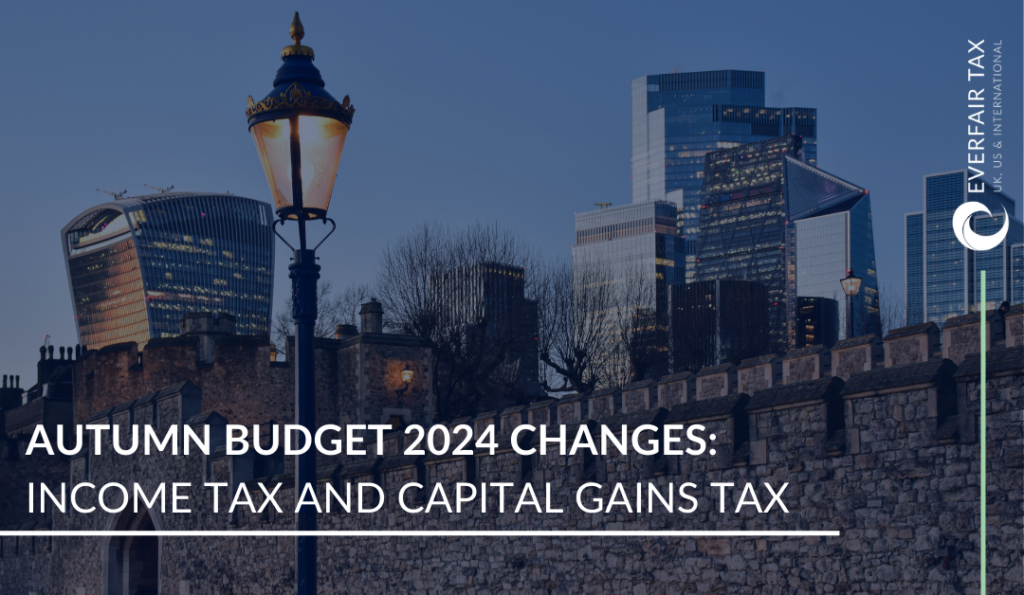Summary of Changes for Income Tax and Capital Gains Tax Affecting Individuals
The current non-domicile tax regime, including the remittance basis of taxation, will be abolished from 6 April 2025. It will be replaced by a new “residence based” approach. This note focuses on how the changes affect income tax and capital gains tax (“CGT”) for individuals. Separate notes consider the impact on inheritance tax and offshore trusts.

New Residence Regime
From 6 April 2025 all UK residents will be taxed on the arising basis (worldwide income and gains), however, for individuals who have previously been non-resident for 10 years, a new regime will be available for the first 4 years of residence as determined by the statutory residence test).
In those 4 years, a taxpayer can claim to exempt from tax the foreign income and gains (“FIG”) arising. A claim will need to be made each year and can include either or both foreign income and/or gains. Unlike under the remittance basis regime currently in place, there will be no requirement to retain the exempted FIG outside of the UK, and the FIG can be brought into the UK in the same or future tax years.
Temporary Repatriation Facility
From 6 April 2025, a new temporary repatriation facility (“TRF”) will be introduced to encourage taxpayers to bring funds into the UK in respect of FIG that were not taxed in the UK in previous years as a result of a claim for the remittance basis.
Whereas before 6 April 2025, a remittance of such funds to the UK would attract an income tax charge of up to 45%, the TRF will allow taxpayers to designate FIG and be subject to a tax rate of 15% in the 2025/26 and 2026/27 tax years, and 15% in the 2027/28 year. Once designated and the charge paid, the funds can be brought into the UK at any time, including after the TRF period of 3 years has finished.
Overseas Workday Relief
Currently, overseas workday relief (“OWR”) is available in the first 3 years of tax residence to resident but non-domiciled employees on overseas earnings (i.e. days worked outside of the UK as part of their employment) paid and kept outside of the UK.
From 6 April 2025, with the ending of the non-domicile regime, the relief will be available for the first 4 years of residence. As a key development, there will no longer be a requirement to retain the earnings offshore and so the relief will also be available for those who are paid into a UK bank account, or just want to use the earnings in the UK.
For the first time, OWR will have a limit on the amount to be claimed in each tax year. The limit will be the lower of 30% of the employment income or £300,000, although the limit will not apply to those who are already claiming OWR by 5 April 2025 and are able to continue to claim in 2025/26 or a later tax year.
Capital Gains Tax Rebasing
UK resident taxpayers who are unable to use the new 4 year FIG regime outlined above, will be subject to CGT on foreign gains.
However, as a transition measure, and subject to conditions, those who have claimed the remittance basis by 5 April 2025, will be entitled to rebase foreign assets for CGT purposes to their market value at 5 April 2017.
The transitional measure is not available for those who have been UK domiciled or deemed domiciled in the UK prior to 6 April 2025.
CGT Rates
The CGT rates on all disposals (aligning with those previously in place for residential property) are now 18% for basic rate taxpayers and 24% for higher and additional rate taxpayers, with the new rates coming into effect on Budget Day.
Where a claim for business asset disposal relief (“BADR”) is possible on a disposal after 6 April 2026, the rate is increasing from 10% to 14%. The lifetime allowance will remain at £1m.
The same rates of tax applicable where a claim for investors relief is available (on certain unquoted trading companies), although for investors relief there is a reduction in the lifetime allowance to £1m (previously £10m).
For those subject to CGT in respect of carried interest, the CGT rates are increasing to 32% from 6 April 2025.




